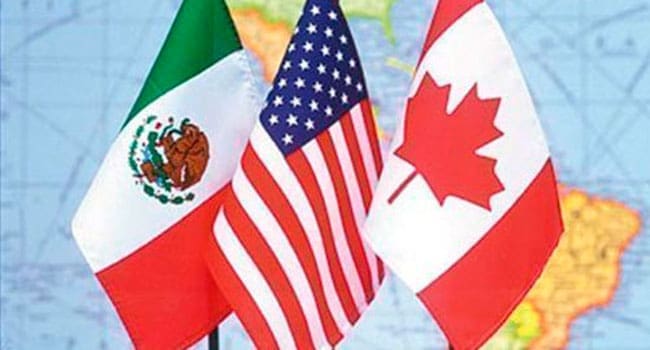 Talks to refresh North America’s trade agreement seem to be heading nowhere, and that could spell serious trouble for our agrifood sector.
Talks to refresh North America’s trade agreement seem to be heading nowhere, and that could spell serious trouble for our agrifood sector.
Wanting to push back on Mexico’s influence over the U.S. economy, Washington now seems to favour a bilateral deal with Canada.
But for our agrifood sector, many wonder how life will look like without the North American Free Trade Agreement (NAFTA).
Should NAFTA end, there is no doubt tariffs will rise and will impede cross-border supply chain efficiency. In fact, The Peterson Institute for International Economics suggests tariffs on agricultural commodities and other food products could go up by 3.5 per cent on average for the U.S., 4.2 per cent for Canada, and 7.5 per cent for Mexico. This brings a lot of uncertainty to major agricultural sectors like cattle, hogs and many grains.
In agrifood, Canada has a trade deficit with the U.S. market. We sell the U.S. about $22 billion worth of goods while the Americans sell us $24 billion worth of food products, ranging from produce, baked goods and processed food items. But these numbers hide an inconvenient truth as to what our agrifood economy is about on a global stage. Most of what we sell are raw commodities which have been processed at a very basic level, only to buy them back, packaged or in a bottle, at 20 times the price.
This is perhaps the wake-up call Canada needed. For years, Canada has been a trade-reliant agricultural economy and has never been compelled to become strategic about trade. Our global position on agrifood trades has been weak at best. With more than 120 marketing boards across the country, our economy has been obsessed with countervailing oligopolistic powers upstream to protect our farmers.
Farming needs support, but most of our agricultural policies have been at the expense of processing and distribution. Some companies have successfully hedged against Ottawa’s decades-long nonchalant focus on trade. Saputo in Montreal and AGT in Saskatchewan are two brilliant examples. It is only recently, with attempts to join TPP and with CETA, that Ottawa has shown signs it realizes it needs to up its game on trade.
We can blame Washington all we want for the NAFTA impasse, but Canada has not demonstrated it wants to liberalize its trading position either. Ottawa has perhaps signaled it wants to modernize the tri-country trade pact, but it seemed unwilling to make major concessions. We seem content to play defence against Goliath.
Some of the most vibrant agrifood economies in the world have been engaged on the global stage to give their agrifood sector a sense of purpose. Meanwhile, as the rest of the world progresses, we allow cartel-esque agencies to support commodity groups like dairy, eggs, poultry, maple syrup and many other sectors. In fact, we are still trying to figure out what our agrifood strategy will look like.
To offset U.S. President Donald Trump’s wrath, Ottawa did everything to prepare itself for NAFTA talks, except for one thing: IT failed to consider itself an agrifood powerhouse in the making. To get there, we need a shift in our mindset.
Washington is inviting Canada to address a dilemma, which we have never wanted to face. CETA (the Canada/EU trade agreement) was a miracle that happened in spite of ourselves. Canada is not even close to having a trade deal with the second largest economy in the world –China. It should be a priority for Ottawa.
Canada should start thinking about how it could reform its supply management system so it makes sense to the rest of the world, not just us. It also should also think of ways we can capitalize on our new trading friends in the EU.
We also need to think about increasing our processing capacity, and sell semi-processed or finished food goods to the rest of the world, and not just wheat, barley or beef. Research suggests exporting companies are always more innovative. For any agrifood economy, it is always challenging to build a competitive advantage with raw commodities.
The cruel truth is that Canada’s agrifood influence is irrelevant to the rest of the world. The Trans-Pacific Partnership was created, and killed, and Canada’s opinion hardly mattered. U.S. media barely covered Trudeau’s latest visit to Washington. So instead of trying to please an ambivalent neighbour, it is time for Canada to seek more new friends on the world stage.
Sylvain Charlebois is Senior Fellow with the Atlantic Institute for Market Studies, dean of the Faculty of Management and a professor in the Faculty of Agriculture at Dalhousie University, and author of Food Safety, Risk Intelligence and Benchmarking, published by Wiley-Blackwell (2017).
The views, opinions and positions expressed by columnists and contributors are the author’s alone. They do not inherently or expressly reflect the views, opinions and/or positions of our publication.

